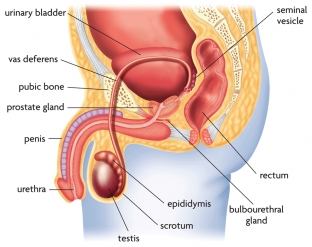A man at the doctor's office, complaining of problems in the urogenital area and age-related changes associated with the work of the cardiac and neurological systems, is the least expected to hear that he has entered a period of menopause. However, even in the scientific world, disputes do not stop that menopause in men is considered an incorrect concept, and it is desirable to replace it with something like age-related androgenic & nbsp; deficiency, age-related hypogonadism or andropause.
However, the manifestations of male menopause are quite comparable to female menopause, and therefore require the help of a doctor in correcting this condition.
When and why menopause develops in men
The concept of female menopause is usually characterized by the loss of a woman's ability to bear children, which is accompanied by a gradual cessation of menstruation and a number of changes in various body systems. In men, reproductive function is often preserved until a very respectable age, however, they also experience physiological aging of the body associated with hormonal imbalance.
With age in the male the body reduces the production of androgens, which entails a cascade & nbsp; pathological changes in the cardiovascular, nervous, endocrine, urogenital and other body systems. The aging process, or menopause in men, is associated with a decrease in testosterone secretion. Its content peaks at about 30 years of age, after which it begins to decline steadily.
By 80 a man retains approximately 20% of this hormone in a free form compared to a young age (although it must be recognized that usually the testosterone level never decreases to the level of absolute hypogonadism). At the same time, the content of melatonin, somatotropic hormone, decreases in parallel, the level of estrogen fluctuates, the work of the hypothalamic-pituitary system is disrupted, and the number of Leydig cells in the testicles decreases.
All these age-related hormonal changes cause menopause in men, the manifestations of which in various organs and systems are quite comparable with the corresponding period in women.

What disorders does menopause cause in men
Menopause in men is manifested by a wide variety of symptoms, so that the patient can receive symptomatic treatment for a long time for health problems from different specialists before he agrees that his age-related changes require special replacement therapy.
The most typical menopausal complaints in men are as follows:
- problems in the sexual area: decreased libido, disappearance of spontaneous erection in the morning, sexual dissatisfaction, premature ejaculation;
- problems in the emotional sphere: memory impairment, irritability, depression, insomnia, decreased performance;
- vegetative-visceral problems: increased sweating, facial flushing and sensation of hot flashes.
Read also: "Calm down friend, this is menopause! How does menopause begin in men"
Menopause in men and the reaction of all organs and systems
Menopause in men is manifested not only in the genital area, hormonal changes affect the work of almost all organs and systems:
- cardiovascular – disturbed by arrhythmias, cardialgia, arterial hypertension develops, atherosclerosis of the coronary arteries;
- nervous – increased risk of ischemic stroke, increased fatigue, memory impairment;
- urogenital – urinary incontinence develops, weakening of its jet, nocturia, frequent urge to urinate;
- endocrine – metabolic disorders leading to a decrease in bone mineral density, constipation, obesity.
The presence of these symptoms becomes the basis for a comprehensive diagnostic examination, so as not to miss a more serious disease against the background of menopausal manifestations.
Help with menopause in men to improve the quality of life
Menopause in men can and should be adjusted to improve the patient's quality of life. For this, hormone replacement therapy is used, as well as remedies from the arsenal of herbal medicine, homeopathy, and physiotherapy.
Thus, age-related changes in the state of health are quite amenable to correction, if you choose the right individual treatment regimen. The patient should know that reasonable physical activity, regular sexual activity, proper nutrition and rest will help to significantly alleviate the condition and prevent aging.









Add a comment